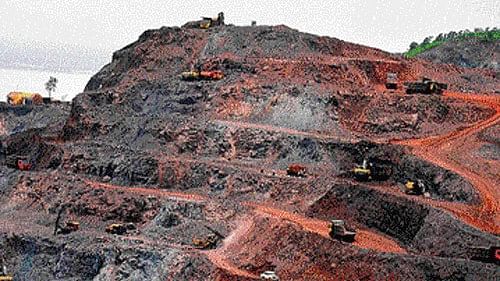
Representative image of mining.
Credit: DH File Photo
Bengaluru: Mining companies who get permission to dig forest areas by giving an undertaking to shut operations in the night are lobbying for 24X7 operations, with the state government setting up a committee to explore such a possibility following pressure from the mining department.
For the last few years, the forest department has been resisting the pressure from several mining companies to relax various restrictions on the mining operations.
Many of the restrictions were introduced by the Lokayukta following the destruction of forests and natural resources in the decade of illegal mining till 2010.
Over the last few months, the Federation of India Mineral Industries (FIMI) had been writing to the Forest Department with two specific demands. First, the federation wanted to conduct mining operations 24X7.
Secondly, an end to the manual transit pass system, which was introduced after the Lokayukta Justice (retd) Santosh Hegde's probe exposed illegal extraction and transportation of iron ore in (undivided) Ballari district.
The development comes a year after the Environment Management Policy Research Institute (EMPRI) submitted a report to the Forest Department that allowing mining operations after 6 pm will have a negative impact on the wildlife.
Additional Chief Secretary, Forest, Ecology and Environment, N Manjunath Prasad held a meeting with senior officials of the Forest Department and FIMI members on October 5 to discuss the demands.
Proceedings of the meeting show that the FIMI members arguing for 24-hour operations by pointing to systems in other states. "The members informed that mining of iron ore and transportation in Karnataka is allowed between 6 am and 6 pm. It was also stated that MMDR Act, the Karnataka Forest Act and the Mines Acts do not bar the mining of iron ore in three shifts all through the day," the proceedings said.
Prasad rejected the demand with regard to manual permits. With regard to extending operations, cited a report by the Ballari deputy conservator of forests and th3e proceedings of the district task force committee to note that "forests and its wildlife need some respite" for at least half of the day from the pollution and disturbance caused by mining and transportation of the ore.
He suggested seeking the opinion of the Supreme Court-appointed monitoring committee. "The committee is a third party in case of mining and has long experience of seeing mining taking place in Karnataka," he said.
However, the Director of state Mines and Geology Department disagreed with Prasad. "He stated that we (Karnataka) are capable of taking a stand in this subject. We can see how mining is done 24 hours a day (in) Odisha, Jharkhand etc," the proceedings said.
The Mines director was, "in particular" opined that rake permit should be given at all times of the 24 hours from railway sidings, which are located in non-forest areas. "A proposal to that extent will be shortly submitted," he stated.
Prasad, however, directed the officials to take the opinion of the monitoring committee. However, he agreed to send a team comprising the principal chief conservator of forests (head of forest force) along with the deputy conservator of forests from Ballari and Vijayanagar divisions to study the 24X7 mining operations in Odisha and Jharkhand.
The EMPRI study found that the conveyor belts -- built as an "eco-friendly" alternative to transportation from lorries -- cause noise pollution despite the steel idlers. Even areas 100 metres from the conveyor belt had a noise level of 90 decibels (heavy traffic) while 40-50 decibels (night suburb) were recorded 250 metres away. It concluded that the noise has a significant negative impact on nocturnal animals.
To a question, Prasad told DH that any decision on the proposal by the FIMI and the Mines Department will be taken up after weighing all the concerns. "The report by the committee of the forest officers will be considered before taking any decision," he said.
Sandur-based activist Sreeshaila Aladahalli said the government should have rejected the proposal at the outset. "EMPRI is a state government institute. Its findings should be taken seriously. We don't want further disturbance to the wildlife here," he said.
A senior official noted that the situation in Jharkhand and Odisha were not similar to Karnataka. "Illegal mining has led to plundering of minerals and destruction of thousands of acres of forests in Karnataka. Besides, the biodiversity and ecology of the states is different. We can't blindly follow others. On the other hand, we need stricter enforcement of the forest clearance conditions imposed on mining companies," he said.